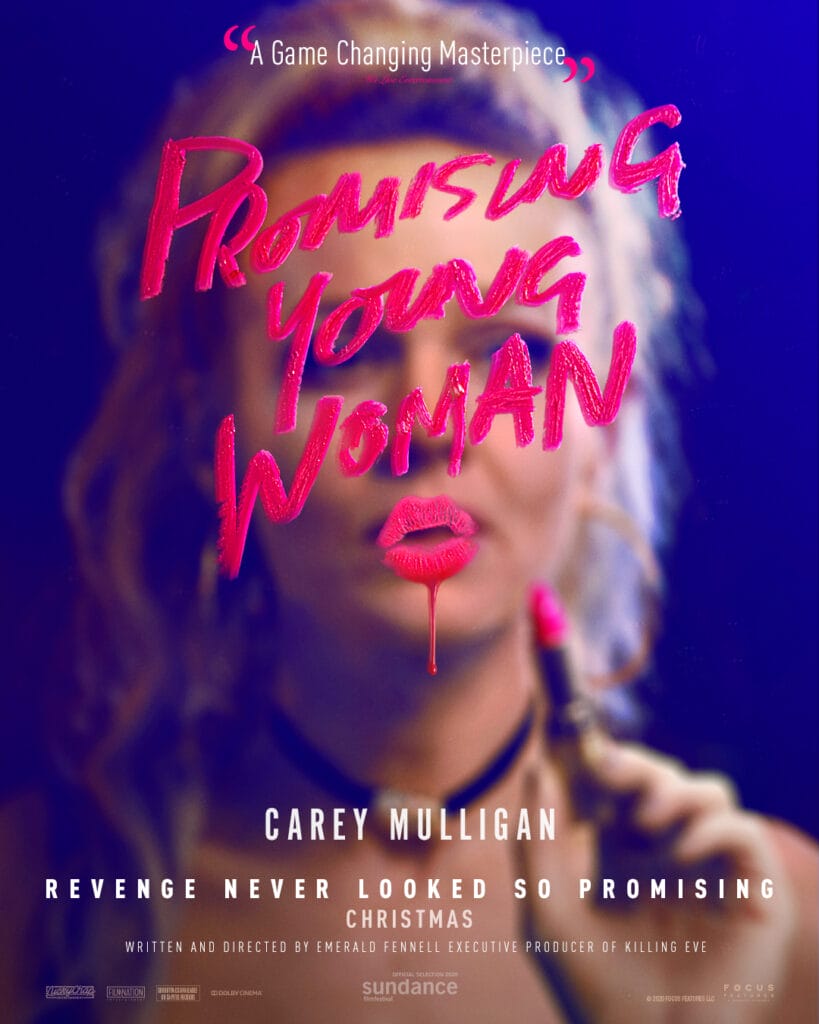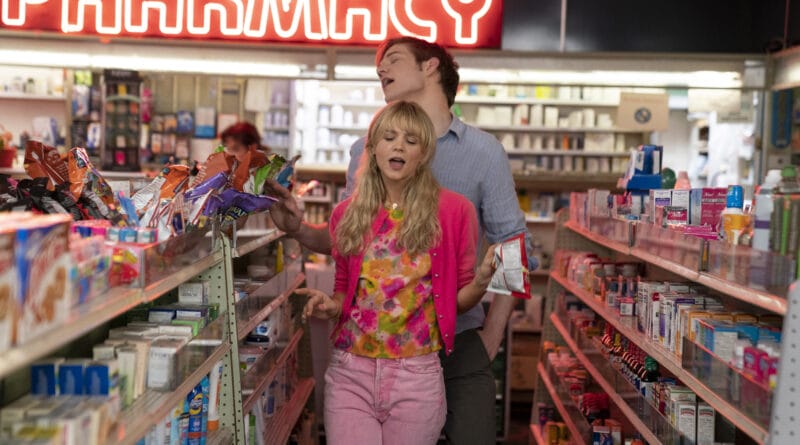Promising Young Woman offers an extraordinarily fresh premise but is constantly bogged down by narrative choices that keep its thrilling story from reaching its full potential. The film finds its core strength in its lead performance from Carey Mulligan.
Beneath Promising Young Woman’s glitzy, neon personality you will find a dark revenge story with the topic of rape/sexual assault at its center. Emerald Fennell’s feature film debut fires on all cylinders to depict real-life traumas held by women. Our main protagonist, Cassie, is a med school dropout that works as a barista. By night, Cassie bar hops, feigning intoxication to lure men with the intention of taking advantage of her. When her deception is in full effect, Cassie awakens from her drunken persona and reveals to her exploiter their own predatory behaviors.
From the very beginning, it’s made clear that a mysterious event derailed her career and set her on a path away from the promising young woman she was meant to be. It’s revealed that the root of Cassie’s motivations lies in the rape and assault of her best friend Nina, who tragically took her own life before the film’s events. When the opportunity to get revenge on Nina’s abusers arises, Cassie is set on bringing Nina’s assailants to vengeful justice.
There is a gravitational pull towards a premise that entails a revenge story involving sexual assault. Promising Young Woman captivates in its bold statements on not only empowerment but the deconstruction of the idea of exploitation. Fennell makes it crystal clear that there is a certain level of denial when it comes to predatory impulses, it’s not as complex as men make it out to be. Cassie provides the perfect vehicle to explore the excuses made by men to bypass predatory behavior. With Cassie’s motivation to turn the mirror on exploiters, it turns each deception into a study.
One man will keep a woman drunk to keep her submissive, one will feign the “good guy” persona to get someone in his bed, or most importantly, one will turn a blind eye to blatant exploitation. Fennell makes every one of Cassie’s encounters a chance to teach, that consent is SET. There isn’t wiggle room, there isn’t a place for excuses. It’s the definitive statement on men’s privilege that feels poignant and profound.

Fennell also added a unique aspect to some of the situations depicted on the screen. There was dark humor to some of the philosophies presented. Free from complete irreverence, it was a dry, almost non-existent, kind of humor that added a layer of lightness to how dark the premise can get. In some times, it’s comedic timing was its downfall, but added to the overall magnetism of the story unfolding.
Fennell’s statements translated well with the use of characters’ motivations but didn’t quite hit all the marks. The themes and messages were often lost in how unbalanced the tones felt throughout the film. Part of it is attributed to the rushed romantic arc, and part of it is attributed to Cassie remaining an underdeveloped protagonist throughout the film. Though these damaging aspects will go over any casual watcher’s head, It shaved off any weight that Fennell’s messages held. But thanks to Bo Burnham and Carey Mulligan’s chemistry, it was bearable. The romance also built on Cassie’s commitment hesitation, deepening our understanding of the character.
However, my disappointment lied with the unshakable feeling that Cassie could be so much more. The film itself had an undeniable charismatic flare, but some of the charisma failed to be inhabited by Cassie. Cassie displayed cunning and deceptive intelligence but didn’t have any of the charms that came with the film’s staging and witty approach.
Despite having the entire film revolve around Mulligan’s character, there was a sharper focus on the narrative than the introspection needed to add a bit of depth to Cassie. Without the writing to develop Cassie, Carey Mulligan filled most holes to redeem the character. Easily one of Mulligan’s best performances to date, she inhabited everything that represented Cassie. There was an unspoken rage to Mulligan’s performance that looked and felt real. She perfectly displayed repressed emotion and added the bit of nuance that the film was in desperate need of.
Despite the narrative woes, Fennell executed each charismatic aspect with precision. The creative decision to mask a thriller behind a pink and glamorous facade is one that I revere. Fennell’s staging effectively aligns with the themes of deception and manipulation presented; with its recurring colors, dollhouse-esque settings, and its induction of a romantic sub-narrative. This layered stylistic approach applies charisma and charm to the neon flare presented.

The more I think about this film, the more I appreciate it. There is no denying that Emerald Fennell’s feature film debut stands out as a poignant take on trauma and revenge. What often felt like a parable, was actually a thrilling revenge story uplifted by a powerful performance from Carey Mulligan. The end result is definitely one of the best film endings of the year. Fennell expertly crafted a story that offers so much to unpack and so much to think about.
For more film and tv news, trailers and updates, make sure to keep it locked right here at The Nerdy Basement. And while you’re here, please consider supporting us on Patreon. It’s an easy way of supporting us so we can keep proving you with your Nerdy News!

